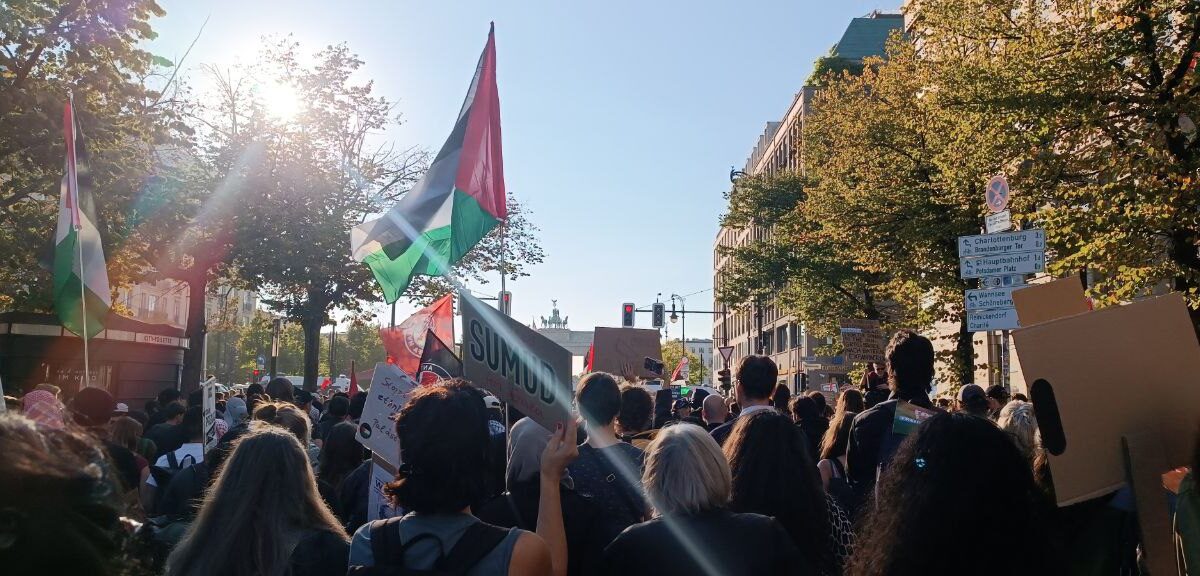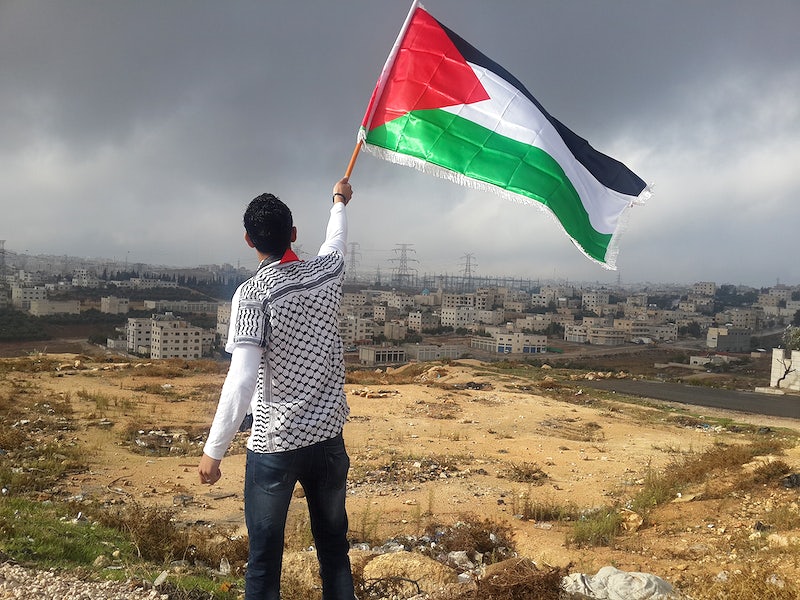Last Saturday in Berlin, more than 100,000 people marched against the genocide in Gaza. The number, impressive and necessary, did not produce unity. Two parallel demonstrations took place in the city: Together for Gaza / All Eyes on Gaza, organised by members of the Palestinian community in Berlin, cultural figures, NGOs, and the German party Die Linke; and a self-organised rally by grassroots movements, including PA Allies and the Alliance of Internationalist Feminists, under the motto United for Liberation, Fight Normalization, which focused on radicalism and independence. This was not a minor organizational detail: the split reflects a political fracture running through the movement. The question is blunt: who benefits from this division?
Two demos, two logics
Together for Gaza set off from Neptunenbrunnen (Alexanderplatz) and culminated in the event All Eyes on Gaza at the Siegessäule. It was convened by members of Berlin’s Palestinian community alongside public figures such as Deborah Feldman and Michael Barenboim, and endorsed by Die Linke. The stage hosted speeches and musical performances, co-hosted by Palästinensische Gemeinde Deutschland, Eye4Palestine, Amnesty International Germany, and Medico International. It was a nationwide call to bring a broad front into the streets, reassuring people who had never protested before.
The second rally was called by grassroots movements, in particular PA Allies and the Alliance of Internationalist Feminists, the same groups that have consistently taken to the streets for two years against the genocide, met with relentless persecution by the police and the mainstream press. Their slogan was United for Liberation, Fight Normalization. Its route ran from Moritzplatz to Südstern, in Kreuzberg. Not a counter-event, but an assertion of autonomy.
The Together for Gaza platform articulated clear demands: the termination of all military cooperation with Israel, including transit and trade of weapons; an immediate and lasting ceasefire; unrestricted humanitarian access; an end to decades of illegal occupation and displacement; respect for international jurisdictions and enforcement of their decisions; release of Palestinian political prisoners and Israeli hostages; recognition of Palestinian self-determination; and protection of freedom of expression and protest in Germany. These are precise demands, rooted in urgency and international pressure: contingent objectives to halt the bombings, allow aid to enter, and reduce German complicity.
The two statements of the grassroots movements were equally plain but opposite in direction. “Unity” was called an illusion: silencing movements under the false claim of unity is a worn-out colonial tactic that separates the obedient from the aggressive. They lament the NGOisation: the transformation of struggle into a humanitarian project, the replacement of rage with the neutral language of human rights, and the belief that panels, conferences and reports cannot stop a genocide. “Human rights becomes the mask that makes pacification acceptable,” they wrote, “reducing genocide to a humanitarian crisis and colonisation to a dispute between two sides.”
They exposed media hypocrisy: the spotlight on white activists injured by police while Palestinian refugees remain invisible; the performative fury of NGOs that mobilise against the deportation of four European citizens while ignoring systematic deportations from the Global South. In short, they rejected pacification: the idea that institutional banners and mass optics can replace the slow, risky work of autonomous organisation. “Being among the masses is not inherently revolutionary,” they insisted; autonomy and clarity are what matter.
Both demonstrations originated within the Palestinian community in Berlin and Germany, which, like any community, is not monolithic. Legitimising one faction and delegitimising another reproduces the all-too-familiar dynamic of “divide and rule” in Germany, visible with the artificial division between “good Jews” and “bad Jews”, between those who align themselves with the pro-Zionist narrative and those who contest it. Repeating this pattern for Palestinians means playing the same political game that fragments solidarity.
The frustrations with the mass demonstration are understandable: many of the actors who participated had remained silent until recently; many have hesitated to use the term genocide to describe the situation; some diluted slogans such as “stop all wars” have appeared, flattening the well-defined roles of oppressors and oppressed into an immoral equivalence; some personalities who suddenly claimed visibility had previously been absent. These criticisms are real. Yet the purpose of a protest is not to demonstrate the ideological coherence of a movement, but to put pressure on politics. To intimidate power. To disrupt business as usual. To do so, numbers matter. On Saturday, those numbers were there.
The importance of a common front
When ideals harden into dogma and dialogue is cast aside, antagonism becomes an end in itself. That is not politics. It is political suicide. The constant hunt for enemies falls into the same trap.
Criticism of institutions and NGOs is not merely legitimate. It is necessary. Critique pushes organisations to expand their limits, prevents co-optation, forces accountability. But criticism must not automatically turn institutions into enemies. As Amnesty International’s president Agnès Callamard reminded, “NGOs do not stop genocide. Doctors don’t stop genocide. Human rights investigators don’t stop genocide. States stop genocide. Companies can stop genocide.” Governments and companies are the targets of pressure; NGOs, with all their flaws, are part of the infrastructure that can exert and sustain that pressure.
The same complexity applies to the United Nations. Yes, the UN is a device of Western state power with a long record of managing, not dismantling, imperial orders. Yet it remains the only global forum capable of projecting visibility at scale. It has repeatedly failed to prevent catastrophes. An alternative is urgently needed. Until then, using that window while continuing radical work from below is both pragmatic and necessary.
This logic extends to individuals. Francesca Albanese, criticised by one of the grassroots movements, operates within the structural limits of the UN, and still she has channelled the voices of millions, taking personal and professional risks. Of course she is not in Gaza; she does not endure bombardment. But she is an ally who amplifies visibility and hope. The same applies to Kitty O’Brien, beaten by police at a pro-Palestine rally, who also came under scrutiny: their injuries went viral because they’re white and European, and they’ve acknowledged that reality. Precisely because of that visibility, their wounded body exposed Germany’s police state and became a vehicle of attention and visibility. Treating such figures as categorical enemies is counterproductive; they are contingent allies who can shine light into systemic darkness.
Karl Marx’s conception of the united front is instructive: uniting for a common cause does not mean dissolving differences. A united front does not erase fault lines or tactical disagreements; it contains and recognises them. Struggles can run in parallel, sometimes irreconcilably, because they serve different purposes. Some wage institutional pressure, others build organisation from below; some push for immediate gains, others refuse to retreat from the horizon of total liberation. None of these paths are sufficient alone. Rejecting the need for a common front means abandoning the only instrument that can translate rage into political force: the capacity to strike together while remaining different.
Who benefits from division?
Not the Palestinian cause. Internal splits hand the state and mainstream media a perfect tool: depict one wing as undesirable and marginal, weaponise that image to criminalise the whole movement, and elevate “moderate” interlocutors to defuse pressure. The fracture often functions exactly as intended, to blunt the disruptive potential of protest.
Yet the mass demonstration was hardly distant from radical demands: it claimed a halt to the bombing, an end to arms trade, and recognition of occupation. These were contingent, winnable aims. People could have marched together to the point of convergence and then separated when demands diverged.
Organising also means educating, and education happens through dialogue. Bringing an autonomous bloc into a larger demo, with a real radical presence, could have been a strategy to win new adherents rather than to consolidate existing circles. Many arrived late and hid behind neutrality or the fatal rhetoric of “two sides.” Precisely for that reason, the mass demonstration was the terrain to push discourse, not to abandon with disdain.
The movement needs both rage and numbers. Prioritising ideological purity over political pressure will cost both. Prioritising numbers without political consciousness will cost its soul. Meanwhile, in Gaza, people are still dying from bombs, drones, and starvation. We cannot afford to squander time and energy on internecine purity tests. Walking together, step by step and as far as possible, will amplify pressure. And then, continue fighting separately where necessary, until total liberation is achieved.



